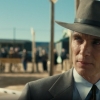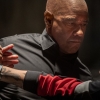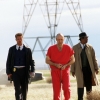Met de première van The Dark Knight Rises afgelopen weekend is er een einde gekomen aan de vier jaar lang speculeren over het plot van de laatste Batman film van regisseur Christopher Nolan. In een uitgebreid podcast interview van Empire met de regisseur komen een aantal aardige onderwerpen aan bod. Zo gaat Nolan in op de start van de trilogie in 2003 met Batman Begins, het gat van 8 jaar in de films tussen The Dark Knight en Rises en het gerucht dat er ook een vier uur durende versie zou zijn van TDKR. Ook geeft Nolan een advies aan zijn opvolger die mogelijk aan de slag moet met een reboot rond de Caped Crusader.
Nolan kijkt terug op de start in 2003 met Batman Begins. Wist hij bij aanvang al waar hij aan begon? Nolan: I certainly wasn't that forward thinking. I really, only dared think about what Batman Begins was going to be just because I'm a bit superstitious and I didn't want to make any assumptions about what people would think of that film, whether people would want to see my take on the character on a longer term. So, with each of the three films, we really just tried to tell everything we had to say about that character in that film as if it was the one chance we had to deal with the characters.
Ook wordt hem gevraagd waarom hij het risico heft genomen om een gat van 8 jaar tussen The Dark Knight en The Dark Knight Rises te plaatsen: It's partly about a physical and emotional toll and it's partly about being true to the end of [The Dark Knight]. What you have at the end of The Dark Knight is an ending that hangs very much on substantial sacrifice to achieve a certain end and for that to have meaning, it has to work in some sense, it has to have been successful. And I didn't want to just abandon that and pick up a new story with a whole new set of ideas. So for me, that lead to the 8 year gap, it lead to the idea of Bruce Wayne, shut away in self-imposed exile because he's hung up his cape and cowl. He's living in a world, at least superficially, that doesn't need Batman but he hasn't moved on, he hasn't moved on as Alfred points out, he hasn't moved on emotionally or in a practical sense.
En wat vond Nolan het meest interessante van het personage Batman: One of things I find the most interesting about Batman is that because he works on the wrong side of the law, because he's a vigilante, you're never really far of the issue of the means and ends. You're never really far from the idea of what is acceptable in terms of fighting crime, in terms of trying to restore the world to some sense of good. And in the first film its very much about corruption about an environment so corrupt that Bruce Wayne couldn't work inside the established structures of the law and he had to move outside it. And that was very important to being able to accept the idea of vigilantism. And I think where we get to, through the next two films, and I think what The Dark Knight Rises really picks up, is the idea of that concept. Working outside the law has become more and more acceptable to Commissioner Gordon. It's become institutionalized in a sense with the lie about Harvey Dent and so the film really picks up with saying 'if we did that in the real world, if that where an underlying lie which prosperity is based on, is that really going to work?'
En afsluitend, welk advies geeft hij aan de regisseur die het van hem overneemt bij een reboot? Nolan: The only advice I would have is that...when I first met with Paul Levitz of DC Comics prior to Batman Begins, he explained to me clearly that Batman, of all superheroes, has thrived on reinterpretation and almost is strengthened by it. And I'm talking about over the years in the comic books but also in the movies. So when the time is right, whenever someone does whatever the next iteration of the character is, they simply need to be true to whatever it is they want to see, to what they believe in, not worry too much about what everyone else is telling them it should be.
Lees hier de FilmTotaal recensie van TDKR en hier meer vragen uit het podcast interview van Empire met Chris Nolan.

























